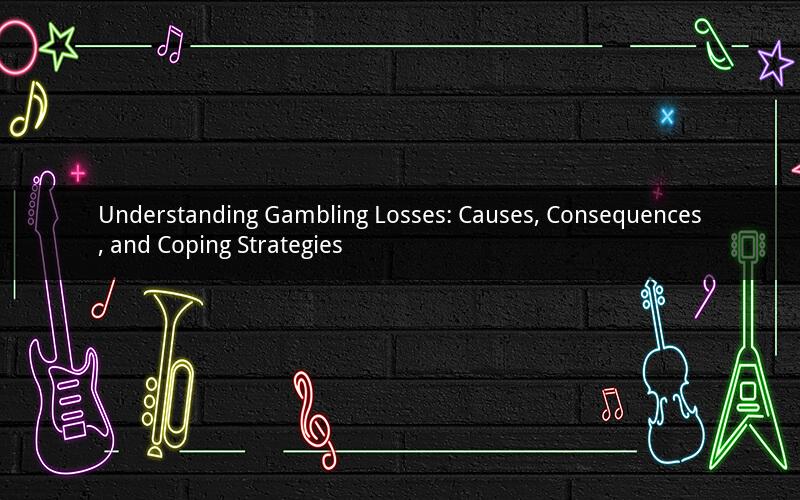
Gambling losses refer to the money or valuable items that individuals lose while participating in gambling activities. It is a common phenomenon among gamblers, and understanding the causes, consequences, and coping strategies can help individuals manage their gambling habits effectively. This article delves into the various aspects of gambling losses, providing insights into why people lose, the impact of these losses, and how to deal with them.
Causes of Gambling Losses
1. Overconfidence: Many gamblers believe that they have a knack for winning and can outsmart the odds. This overconfidence often leads to excessive betting and, ultimately, significant losses.
2. Emotional Distress: Individuals who are facing emotional distress, such as anxiety, depression, or stress, may turn to gambling as a form of escape. This can result in significant financial losses as they try to relieve their emotional pain through gambling.
3. Lack of Knowledge: Some gamblers may not be aware of the odds and probabilities associated with different gambling activities. This lack of knowledge can lead to poor decision-making and, consequently, substantial losses.
4. Social Pressure: Friends, family, or acquaintances may influence individuals to engage in gambling activities, which can lead to financial losses if the person is not a responsible gambler.
5. Impulse Control: Gamblers with poor impulse control may continue to bet even when they are on a losing streak, hoping to recoup their losses. This behavior can result in even greater financial devastation.
Consequences of Gambling Losses
1. Financial Strain: The most apparent consequence of gambling losses is the financial strain it can cause. Individuals may face debt, loss of assets, or even bankruptcy due to their gambling habits.
2. Emotional and Psychological Impact: Gambling losses can lead to feelings of guilt, shame, and despair. This emotional turmoil can exacerbate existing mental health issues or trigger new ones.
3. Relationship Damage: Financial strain and emotional distress caused by gambling losses can strain relationships with family, friends, and loved ones. It can lead to arguments, separation, and even divorce.
4. Legal Problems: In some cases, individuals may turn to illegal means to recover their gambling losses, such as theft or fraud. This can lead to legal consequences, including fines, imprisonment, and a criminal record.
5. Health Issues: The stress and anxiety associated with gambling losses can lead to various health issues, including sleep disorders, heart disease, and substance abuse.
Coping Strategies for Gambling Losses
1. Set a Budget: Establish a budget for gambling activities and stick to it. This can help limit the amount of money you lose and prevent financial disaster.
2. Learn About Odds and Probabilities: Educate yourself about the odds and probabilities associated with different gambling activities. This knowledge can help you make informed decisions and reduce your chances of losing.
3. Seek Professional Help: If you are struggling with gambling losses, consider seeking professional help from a therapist or counselor. They can provide guidance and support to help you overcome your gambling problems.
4. Avoid Triggering Situations: Identify situations or environments that trigger your gambling behavior and try to avoid them. This may include social gatherings where gambling is prevalent or places where you have previously engaged in gambling activities.
5. Build a Support System: Surround yourself with friends, family, and support groups who understand your struggles with gambling. They can offer encouragement, advice, and a listening ear during difficult times.
FAQs
1. What are the most common types of gambling activities that lead to losses?
Answer: The most common types of gambling activities that lead to losses include slot machines, poker, blackjack, roulette, and sports betting.
2. Can gambling losses lead to addiction?
Answer: Yes, gambling losses can lead to gambling addiction, a condition characterized by an inability to control gambling behavior and a preoccupation with gambling.
3. How can I identify if I have a gambling problem?
Answer: Signs of a gambling problem include hiding your gambling activities, lying about your gambling habits, feeling restless or irritable when not gambling, and prioritizing gambling over other responsibilities.
4. Are there any legal measures to prevent gambling losses?
Answer: Yes, some countries and regions have implemented legal measures to prevent gambling losses, such as age restrictions, limits on betting amounts, and mandatory self-exclusion programs.
5. Can gambling losses be recovered?
Answer: In most cases, gambling losses cannot be recovered. However, some individuals may seek legal advice or financial counseling to help them manage their debt and move forward.